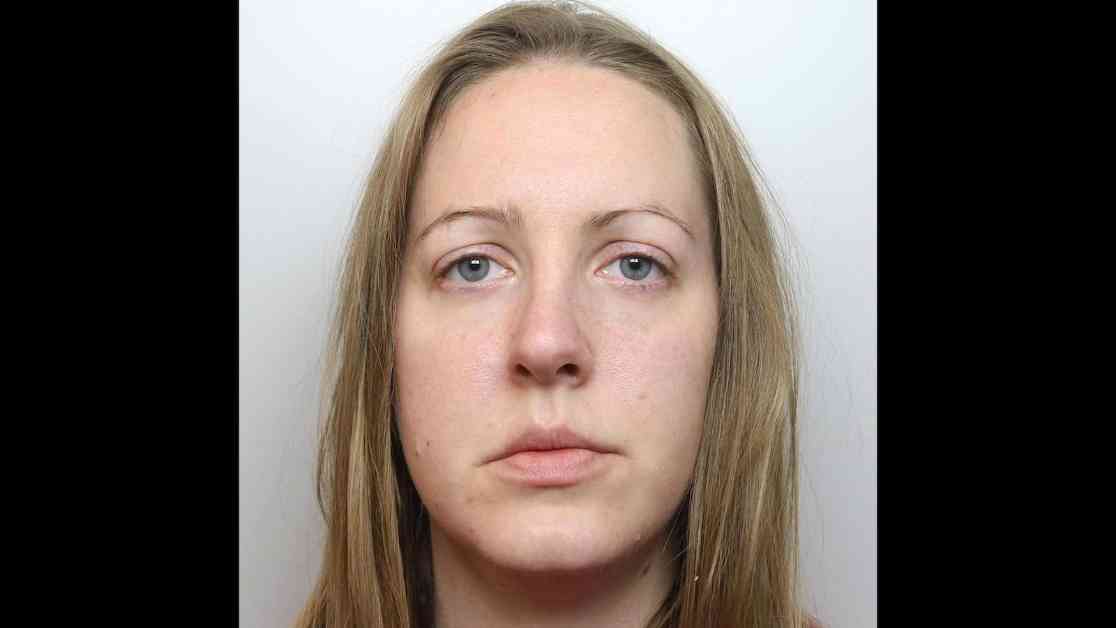**Investigation into UK Hospital Following Nurse’s Conviction for Murdering 7 Babies**
In a shocking case that has rocked the medical community in the United Kingdom, a neonatal nurse was recently convicted of murdering seven babies and attempting to kill seven others at the Countess of Chester Hospital in northwest England. The case of former nurse Lucy Letby has prompted an inquiry into the hospital’s practices and procedures, as well as raised questions about the culture within the National Health Service (NHS).
**The Conviction and Subsequent Inquiry**
Lucy Letby, 34, was convicted in 2023 of murder for seven infants and the attempted murder of six others, including two attempts on one child. She was sentenced to 15 life terms with no chance of release, becoming only the fourth woman in the UK to receive such a term. Prosecutors detailed how Letby harmed the babies in various ways, including injecting air into their bloodstreams, administering air or milk into their stomachs via nasogastric tubes, poisoning them with insulin, and interfering with breathing tubes.
During the trial, Letby maintained her innocence, claiming she never harmed a child. Despite her appeals being rejected, another lawyer is seeking to bring new evidence before the Criminal Cases Review Commission (CCRC) to trigger a potential appeal. Letby’s case has garnered support from a growing number of individuals, particularly after a New Yorker article raised doubts about the evidence used against her.
**Challenges to the Convictions**
A group of scientists, doctors, and legal experts have raised concerns about the prosecution’s use of statistical evidence against Letby. They argue that the legal system is particularly vulnerable to errors when dealing with technical matters, such as statistical anomalies in healthcare settings. Critics have pointed out flaws in the prosecution’s presentation of data, including a chart that purportedly showed Letby was always on duty when babies were harmed. However, experts have cautioned against drawing conclusions based solely on statistical correlations.
Peter Green, a statistician at the University of Bristol, highlighted the limitations of using statistical data to infer criminal intent. He emphasized the need for a more comprehensive evaluation of the factors that led to the deaths of babies at the hospital, without presuming guilt on the part of the accused. Green’s concerns echo those raised in a similar case in the Netherlands, where a pediatric nurse named Lucia de Berk was wrongfully convicted of murdering children based on flawed statistical analysis.
**Scientific Critique of the Prosecution’s Case**
Sarrita Adams, a forensics biotech consultant in the United States, has been following Letby’s case closely and has raised doubts about the scientific evidence presented at trial. Adams’ organization, Science On Trial, conducted a thorough review of the available data and produced a detailed report questioning the prosecution’s claims. One key point of contention was the prosecution’s assertion that Letby had injected air into the babies’ veins or stomachs, causing fatal air embolisms.
Dr. Dewi Evans, the prosecution’s lead medical expert witness, based his testimony on a 1989 research paper describing the effects of high-pressure oxygen on the lungs. However, Adams and other experts have criticized this interpretation, noting that the circumstances described in the research paper are fundamentally different from the allegations against Letby. The author of the research paper later clarified that his study had been misinterpreted and that the evidence did not support the prosecution’s claims.
**Concerns Raised by Legal Experts**
The case against Letby has raised broader concerns about the reliability of scientific evidence in criminal trials, particularly in healthcare settings. The Royal Statistical Society has cautioned against drawing hasty conclusions based on statistical correlations, noting the potential for errors in interpreting complex data. Experts have emphasized the need for a more nuanced approach to evaluating scientific evidence in criminal cases to avoid miscarriages of justice.
Moreover, the families of the children affected by Letby’s actions have expressed distress over the ongoing challenges to her convictions. Tamlin Bolton, an attorney representing six of the victims’ families, highlighted the emotional toll of the case on the families. Despite the legal complexities and scientific debates surrounding the case, the families continue to grapple with the profound impact of the tragic events.
**Conclusion**
The case of Lucy Letby has sparked a broader conversation about the intersection of healthcare, science, and criminal justice. As the inquiry into the Countess of Chester Hospital unfolds, it is essential to consider the complexities of the case and the implications for patient care and safety. The challenges to Letby’s convictions underscore the need for a rigorous and transparent review of scientific evidence in criminal trials to ensure justice is served. As the investigation continues, it is crucial to prioritize the well-being of the families affected by these tragic events and work towards preventing similar incidents in the future.


















